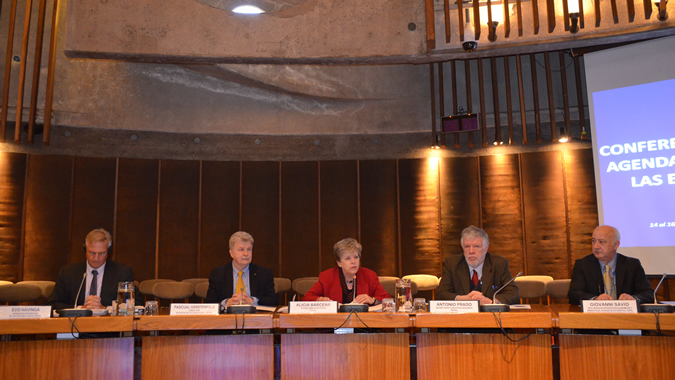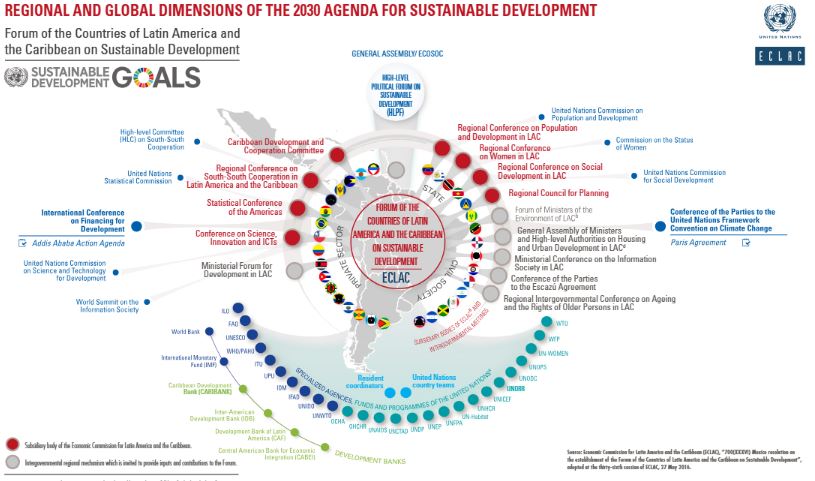Alicia Bárcena: The Region Must Respond to the Challenge of Sustainable Growth with a Big Environmental Push
Work area(s)
In the framework of the inauguration of the Latin American Conference on a Transformative Agenda for Official Statistics in support of the 2030 Agenda for Sustainable Development, ECLAC’s Executive Secretary called on the region to plan investment and spending with sustainability.

Latin America and the Caribbean must respond to the challenge of implementing a sustainable economy with a big environmental push that takes into account investment and spending with sustainability and involves the public and private sectors as well as civil society, Alicia Bárcena, Executive Secretary of the Economic Commission for Latin America and the Caribbean (ECLAC), said today.
In the framework of the inauguration of the Latin American Conference on a Transformative Agenda for Official Statistics in support of the 2030 Agenda for Sustainable Development, which is being held at ECLAC’s headquarters in Santiago, Chile, the most senior representative of this United Nations regional organization recalled that the recent approval of the Paris Agreement by China and the United States—which are responsible for 40% of the world’s emissions—will bring with it an enormous challenge for the region’s economies in terms of sustainability.
To confront this reality, “ECLAC proposes that the region join onto the big environmental push, which includes the promotion of environmental innovation and a transition towards low-carbon paths to growth,” Bárcena said.
The statistical meeting was attended by Philomen Harrison, Director of the Statistical Area of the Caribbean Community (CARICOM); Fernando Montenegro, Chief of Operations at the Inter-American Development Bank; Stephanie Tobies from the European Statistics Office (Eurostat); and Ivo Havinga, Chief of the Economics Statistics Branch at the United Nations Statistics Division.
Other participants included Julio Santaella, President of Mexico’s National Institute of Statistics and Geography and Chief of the Inter-Agency and Expert Group on the Sustainable Development Goal (SDG) Indicators, who also presides the Executive Committee of the Statistical Conference of the Americas.
During her presentation, Alicia Bárcena called for strengthening the region’s statistical institutes and giving them a degree of autonomy equivalent to that of central banks today.
“This will allow them to be independent of political circumstances and respond to the demands for more and better information, transparency and open data that the citizenry is making today,” she said.
Bárcena stressed the importance of integrated statistics at a regional and global level for measuring the 2030 Agenda and the Sustainable Development Goals, and she highlighted the organization’s work towards building a fortified regional institutional architecture.
In that vein, she celebrated the creation of the Forum of the Countries of Latin America and the Caribbean on Sustainable Development, the regional mechanism for following up and reviewing the 2030 Agenda’s implementation in the region.
ECLAC’s most senior representative also called for strengthening national statistics systems with the aim of advancing towards the integration of measurement processes for producing the indicators needed for the SDGs. In addition, she underscored the essential role of the Statistical Conference of the Americas, a subsidiary body of ECLAC and “an essential asset for the regionalization of measurement of the 2030 Agenda in the region.”
Meanwhile, Fernando Montenegro, the IDB’s Chief of Operations, said that measuring systems must incorporate technology as a tool to improve the production and dissemination of data.
Along the same lines, he highlighted the creation of the Tool for Assessing Statistical Capacity (TASC), which allows for evaluating and measuring the statistical capacity of the region’s countries.
Philomen Harrison, Director of the Statistical Area of CARICOM, welcomed the progress made at the Conference on the Transformative Agenda for Official Statistics in support of the 2030 Agenda for Sustainable Development of the Caribbean, held on September 7-9 in Barbados.
Finally, Ivo Havinga, Chief of the Economics Statistics Branch at the United Nations Statistics Division, emphasized that Latin America and the Caribbean will be the only region in the world to have two conferences on the Transformative Agenda for Official Statistics.
The Latin American Conference will be held until September 16 and its conclusions, along with those reached at the meeting in Barbados, will be part of a final report that includes the Transformative Agenda’s concrete operational actions, which will be presented during the 48th session of the Statistical Commission 2017.
Related content
Latin American Conference: Transformative Agenda for Official Statistics
Co-organized by the Economic and Social Commission for Latin America and the Caribbean (ECLAC), the Inter-American Development Bank (IDB) and the United Nations Statistics Division (UNSD). With the…

Regional and global dimensions of the 2030 Agenda for sustentainable development
Forum of the countries of Latin America and the Caribbean on Sustainable Development.
Subregional headquarter(s) and office(s)
Country(ies)
Contact
Public Information Unit
- prensa@cepal.org
- (56 2) 2210 2040
